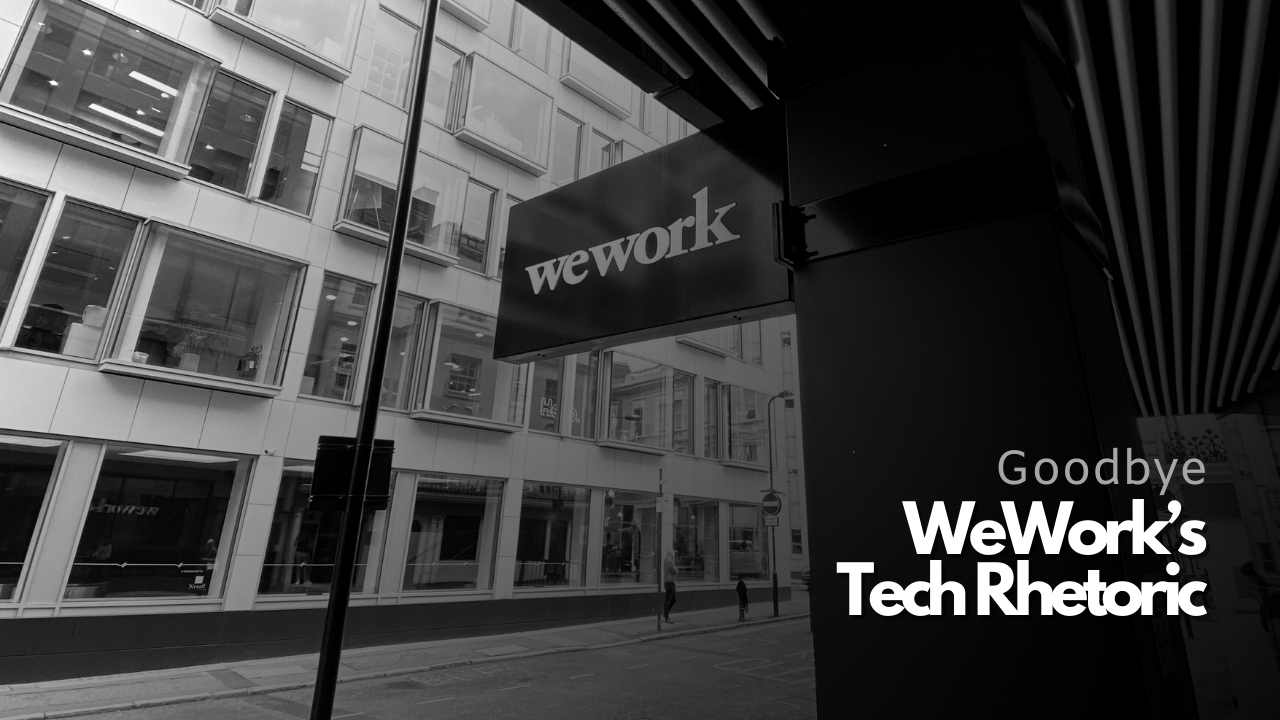- WeWork appears to be shifting its focus away from ‘technology’.
- But still claims its tech allows the company to ‘gather data at scale and apply machine learning’.
- WeWork recently opened a space in the tech-focused city of Cambridge, UK.
I’ve long been baffled by WeWork’s ongoing claims that it’s a technology business. And, following Adam Neumann’s much-publicised departure, it looks like the company is starting to drop its emphasis on technology too.
Published on November 8th, the word “technology” is not mentioned once throughout the 50-page plan to overhaul the company over the next 90 days. Compare that to WeWork’s S-1 filing, which used the word “technology” 93 times.
Neumann continually positioned the company as a technology platform. It many ways, it’s a savvy move as tech companies tend to be highly valued, compared to real estate ones, according to this report. But it’s clearly not a strategy that’s worked in the long term following the company’s IPO filing debacle.
Instead, the recent 90-day “game plan” report claims the company will now focus on its “core WeWork desk business”. And its previous founder-led leadership model will be replaced by one that uses “proven executives in membership-focused, subscription-based businesses”.
The report also revealed that the company continued to grow throughout Q3 2019, adding a record 108,000 desks worldwide.
In fact, only last month, WeWork opened a space in the centre of my hometown – Cambridge, UK. It seemed like a good opportunity to find out more about its current stance on technology.
WeWork in Cambridge
Dubbed the “Silicon Fen”, Cambridge and its surrounding areas are synonymous with science and technology. With £583 million invested in the city’s fledgeling businesses over the last three years, it’s the UK’s second top city for scaleup tech investment. But exactly what proprietary technology is WeWork offering its members?
A spokesperson for the company said: “We provide our members with space, community, and services through both physical and virtual offerings, all built on and powered by data, analytics and deeply integrated technology that help people unlock creativity and productivity.” Which is a statement that isn’t too dissimilar from the blurb on its tech blog.
“We use technology to help us deliver WeWork space more efficiently, build a global community, and improve the workplace experience for members around the world,” the spokesperson continued. “For example, we built technologies to efficiently source, price and deliver locations around the world. These tools automate core tasks by moving manual management to digital systems, while allowing us to gather data at scale and apply machine learning to be more intelligent and expedient in our decision making.”
“We also use technology across our global member community to connect people with services, events and each other based on needs or interests. Through our network and Member app, members can access an international community of creators, attend events based on their interests and search for services that can help their businesses grow.”
It’s an interesting statement and touches on many of the technologies already championed by the company in the past. However, WeWork’s spotlight on technology does seem to have dimmed since that interview with Ashton Kutcher on CNBC. Even the WeWork Technology blog hasn’t posted anything since January 2019.
So, why has WeWork moved to a high-tech city like Cambridge? Well, the city is not only a hub of innovation but it’s also a prime flexible working spot with 7,500 self-employed people, making up more than 10% of the city’s workforce.
“Cambridge is home to a large number of new startups and a diverse, growing community of entrepreneurs, it, therefore, seemed only natural that we should expand to this exciting city,” according to the WeWork spokesperson.
Things are going well for WeWork in Cambridge too, as the spokesperson added: “The interest we have received, and continue to receive, has been incredible. On opening day, we welcomed over 400 new members to 50 Station Road.”
In terms of its members, WeWork Cambridge has a mix of hot deskers, SMEs and enterprise members (companies which have over 500 employees). What’s more, 40% of its members work in internet and software services, while 45% of members are in educational and professional services.
With innovation and startups aplenty, the pull of Cambridge for any coworking space is clear. It looks like the new WeWork spot is building a strong community – and there are even a few technology workshops in its calendar too.
But WeWork’s wider status as a technology company needs a reboot. Technology may still play an important part in the company’s long-term future but it doesn’t seem to have a place in its short-term salvation. And in today’s hyper-digitised times, what company cannot claim to be using or creating digital technology in some way to optimise its business in some way?
As such, it’s time for WeWork to finally drop its rhetoric on technology. Just as it dropped its former CEO.



 Dr. Gleb Tsipursky – The Office Whisperer
Dr. Gleb Tsipursky – The Office Whisperer Nirit Cohen – WorkFutures
Nirit Cohen – WorkFutures Angela Howard – Culture Expert
Angela Howard – Culture Expert Drew Jones – Design & Innovation
Drew Jones – Design & Innovation Jonathan Price – CRE & Flex Expert
Jonathan Price – CRE & Flex Expert












